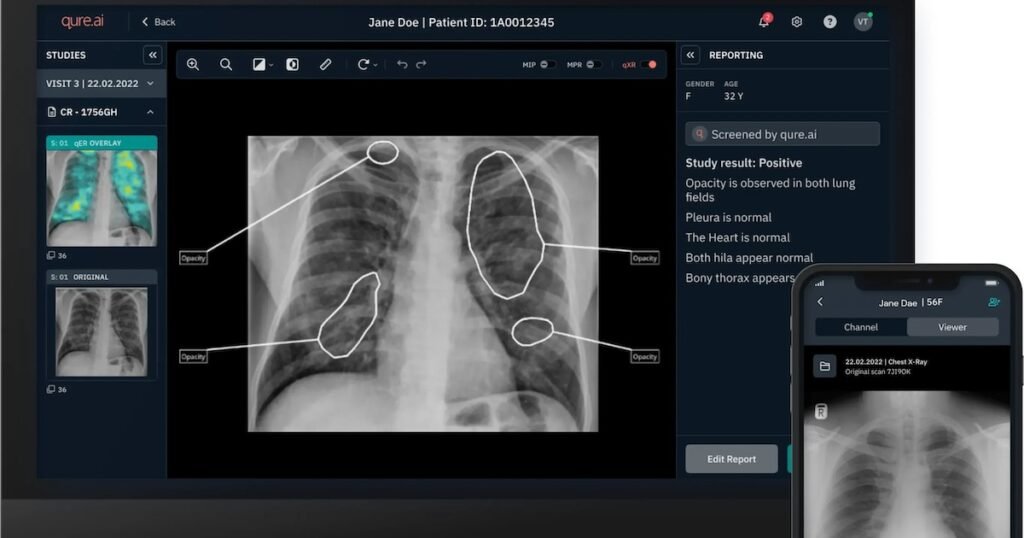Qure.ai Secures $65M in Funding for Advanced AI Development
Qure.ai, a leading AI healthcare company, has recently announced a successful Series D funding round, raising a substantial $65 million. The funding was led by Lightspeed and 360 ONE Asset, showcasing the strong support and confidence in Qure.ai’s innovative AI technology.
The company has outlined plans to utilize the fresh capital to further enhance its foundational AI models and acquire complementary startups in the medical technology sector. Additionally, the funds will be instrumental in accelerating Qure.ai’s expansion efforts in the United States and other key markets.
Earlier this year, Qure.ai achieved significant milestones with two major clearances from the United States Food and Drug Administration (FDA). These include a breakthrough device designation for its tuberculosis screening AI solution, qSpot-TB, and a 510(k) clearance for the lung nodule detection on the qXR AI-powered chest X-ray software.
Mediwhale Secures $12M for FDA Approval of AI-Based Cardiovascular Risk Assessment
South Korean health diagnostics firm Mediwhale has successfully raised $12 million in a Series A2 funding round, with the Korea Development Bank leading the investment. The company is known for its revolutionary retina-based solution, Reti-CVD, which utilizes AI to assess cardiovascular disease risk.
With the latest funding injection, Mediwhale aims to pursue US FDA approval for its Reti-CVD technology. The innovative software has already been deployed across the Yonsei University Health System earlier this year. CEO Kevin Choi expressed determination to secure FDA De Novo approval by 2025, with plans for a subsequent launch in the United States.
In addition to regulatory clearance efforts, Mediwhale is focused on advancing its AI capabilities and developing new solutions for predicting chronic kidney disease risk.
Huawei Introduces Cutting-Edge AI-Powered Medical Imaging Solution
Tech giant Huawei has unveiled a state-of-the-art AI-powered solution for the analysis of medical images. Dubbed “Medical Technology Digitalization 2.0,” this technology enables smart segmentation, detection, and quantitative analysis of medical images with up to 98% accuracy. Huawei claims that the solution can significantly reduce disease diagnosis time by 40%.
The AI solution developed by Huawei can also be seamlessly integrated with ultrasound devices running on the OpenHarmony operating system. Collaborating with local medical technology companies such as MED Imaging AI, Wanxiang, Beijing DeepWise, and KFBIO, Huawei has successfully implemented the solution in major projects like the Fourth People’s Hospital in Shenyang, China.
Korean Pharma GI Innovation Embraces AI for Drug Discovery
Korean pharmaceutical company GI Innovation has entered into a strategic partnership with local firm i-Divine to leverage AI for new drug development. Through this collaboration, GI Innovation aims to enhance its core cancer drug pipelines and utilize i-Divine’s AI solution to identify novel cancer therapy targets.
i-Divine’s AI technology is powered by a large language model trained on a vast dataset of patents, papers, and real-time biological data sourced globally. The AI has already demonstrated success in analyzing the potential of 16,000 new drug substances, including one of GI Innovation’s anti-cancer drug pipelines.
MediBuddy Integrates Philips’ AI-Based Heart Health Monitoring Platform
MediBuddy, a prominent healthcare platform in India, has recently integrated Philips’ advanced heart health monitoring platform into its mobile application. The AI-driven longitudinal triaging solution, known as HeartPrint, enables users to track and assess key biomarkers by simply scanning their finger through their smartphone’s camera.
HeartPrint provides insights on cardiovascular age, diabetes risk, OSA risk, cardio-respiratory fitness index, heart rate analysis, cardiac index, blood pressure variability, and stress disorder prediction. The AI solution also analyzes patterns indicating the risk of developing heart disease, overall health deterioration, heart resilience, and changes in cardiac function over time.
In conclusion, these recent developments in the AI healthcare sector highlight the growing importance and impact of artificial intelligence in revolutionizing medical diagnosis, treatment, and patient care. The advancements made by companies like Qure.ai, Mediwhale, Huawei, GI Innovation, and MediBuddy underscore the transformative potential of AI in shaping the future of healthcare delivery.


